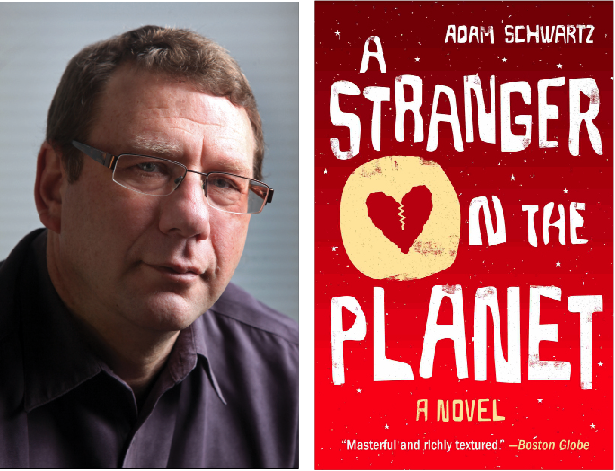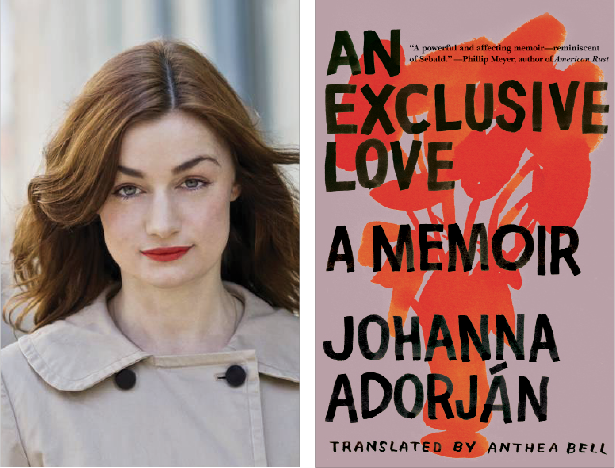Meet Johanna Adorján and Adam Schwartz,
winners of Moment’s annual Emerging
Writer awards celebrating up-and-coming
literary voices.
Fiction winner Adam Schwartz

Adam Schwartz is a senior lecturer of creative writing at Wellesley College whose fiction has appeared in The New Yorker. A Stranger on the Planet follows the life of Seth Shapiro from a mid-century New Jersey adolescence through his tumultuous adult life.
Q| What inspired the book?
A| After my mother read a draft, she replied, “I love the way you capture all my meshugas but humanize me at the same time.” Leave it to my mother to articulate my aesthetic principles so eloquently. The creative impulse is deeply humanistic, to create art that reminds us of what it means to be human. Creating that tension between a character’s meshugas and their humanity is what inspires me.
Q| Why did you write about academia?
A| I was more aware of focusing on Chicago than on academia. Like Seth, I attended the University of Chicago. In 1988, I published a short story in The New Yorker which was somewhat based on my experiences teaching at an all-black college on the south side of Chicago. I returned to Chicago in 2005 for a professional conference. I spent hours walking the streets of Hyde Park, retracing my steps, so to speak, through the story I had written many years earlier. The return visit was a major turning point for me in the composition of the novel. It rekindled Chicago in my imagination, and I ended up setting about 100 pages of the book there. In fact, I completely blew off the conference I was supposed to attend and spent most of my three days writing “Virgins,” the long chapter set at the University of Chicago. Chicago is where Seth undergoes his passage from childhood to adulthood.
Q| Why did it take so long to write?
A| For many years, I didn’t realize I was writing the book I would eventually publish. I thought the stories would be part of a short story collection—my apprentice book. Because the characters in my stories were so similar, I decided to turn the book into a collection of related stories. Once I began writing about the same characters, the stories became more open-ended and the length of novellas. So, technically, I was faced with the challenge of turning them into a novel. But I was also figuring out how to write about a deeply complex and emotionally difficult subject—my family. I knew that I would eventually write a novel based on my family; I just didn’t know that the book of short stories I started to write so many years ago would turn into that book.
Non-Fiction winner Johanna Adorján

Johanna Adorján, born in Stockholm to a German mother and a Hungarian father, now works as a journalist in Berlin. An Exclusive Love tells the story of Adorján’s grandparents, who survived the Holocaust and committed suicide together in 1991.
Q| do you categorize your book as nonfiction, a memoir or something in between?
A| I see it totally as nonfiction. It’s not a novel. These people lived. I tried to reconstruct the last day in the life of my grandparents. I had to make it up, but based on facts. I make it clear in the text that this is my imagination, so it’s two-thirds absolutely nonfiction and one-third fictionalized. In the United States, you call it a memoir—over here, we would call it literary nonfiction. There are no awards for it over here [in Germany]. Normally, the kind of nonfiction that would win an award here would be about something like Stalin or Bismarck, or a really serious, very dry, very well-researched nonfiction book. Over here they don’t really know how to categorize it. They have a bigger heart for memoirs in the United States.
Q| Was writing the book painful?
A| It wasn’t difficult. It was really easy. It was difficult for me before I started to write the book to imagine very vaguely how two old people would kill themselves. I never knew the details, so it made me feel really uneasy. Writing this book made it easier and lifted the weight. The writing process was almost relieving, because if you don’t know something, it feels so much more threatening. Imagination can be so much worse than actual facts. The whole process felt a little bit like going into a very dark cellar and turning on the light for the first time—you see what’s actually in there, and afterward you aren’t frightened anymore.
Q| How important are you to the story?
A| I tried to make me as unimportant as possible. I think you always have to be a little cautious. If you say “I,” it can be very easily too much, because the readers don’t know you, but I felt I was a little important in the respect that I had to explain why I wanted to tell the story, so I’m a character in this book, in a way. I’m telling why I did this and how I did the research, so I felt I needed to be in there, but hopefully not too much.
